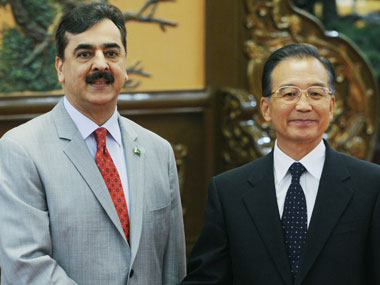By B Raman All eyes in Pakistan are on Prime Minister Yousef Raza Gilani’s four-day visit to China beginning Tuesday (17 May). The dates for the visit were finalised some weeks ago to enable him to participate in the year-long observance of the 60th anniversary of the establishment of diplomatic relations between the two countries. The visit has since acquired special significance in the eyes of Pakistani analysts as it will take place at a time when Pakistan has come in for severe criticism from the US for failing to detect the presence of Osama bin Laden for over five years at Abbottabad, the cradle of the Pakistan Army, where the Pakistan Military Academy is located. Bin Laden was killed by US Navy Seal commandos on May 2. According to Chinese sources, the documents and computer records seized by the raiding party at bin Laden’s residence do not appear to have yielded any evidence so far to indicate that he was in touch with any of the Pakistani agencies. However, the examination of the records and computer documents is still under way. Meanwhile, the Pakistani political leadership, at the urging of the Army and the Inter-Services Intelligence (ISI), has kept the focus rather more on the security failure that enabled the US naval commandos to raid bin Laden’s residence without being detected by the Pakistan Air Force and the Army than on the intelligence failure that enabled bin Laden to live at Abbottabad for over five years. Anger mounting in Pakistan There is widespread anger in Pakistan over the clandestine US raid, and it has led to demands for a re-examination of Pakistan’s relations with the US and of the intelligence and counter-terrorism co-operation between the intelligence agencies of the two countries. A resolution passed during an in-camera session of the two Houses of the Pakistan Parliament on May 13 reportedly threatened to stop the flow of logistic supplies to the NATO forces in Afghanistan from the Karachi port if the US continued with the Drone strikes in the two Waziristans and carried out any more unilateral raids by its commandos in other parts of Pakistan. [caption id=“attachment_10758” align=“alignleft” width=“380” caption=“Pakistan Prime Minister Yousef Raza Gilani (L) is likely to request Chinese Prime Minister Wen Jiabao (R) for more economic and military assistance during his four-day visit to China. Minoru Iwasak/Reuters”]  [/caption] According to reliable Pakistani sources, Gilani is expected to raise with Chinese Prime Minister Wen Jiabao two issues that were not originally on the agenda: namely, the possibility of an increase in Chinese economic assistance to enable Pakistan to resist US pressure, and Chinese military assistance for the strengthening of Pakistan’s air defences near the Pakistan-Afghanistan border. Even though Pakistan Air Force officials have attributed the failure to detect the intrusion of the US choppers to the US’ superior stealth technology, there is also a feeling that the air defences on the Afghan border are not as good as they are on the Indian border and that there is a need to strengthen them. In the current estranged atmosphere, the US is unlikely to help Pakistan in this regard. The Pakistani sources say Gilani is expected to request the Chinese for urgent assistance in this connection. China in a spot Yet, Pakistani expectations of an enhanced Chinese role to enable Pakistan to reduce its dependence on the US have put the Chinese in an embarrassing position. Although the Chinese would like to oblige Pakistan to the extent possible, they would not like to do anything that could come in the way of the fresh initiatives under way for improving China’s military relationship with the US. After a seven-year gap, Gen Chen Bingde, the Chief of the General Staff of the People’s Liberation Army (PLA), is on a week-long visit to the US from May 15. The Chinese would not like any jarring note in the military relations with the US during Gen Chen’s visit on account of any special gesture shown by them to Pakistan. The Chinese are also keen that the US Drone strikes should continue since some of the strikes in the past were directed at the training camps of the Islamic Movement of Uzbekistan (IMU) and the Islamic Jihad Union (IJU) in the Waziristans, which were also training Uighur jihadis from the Chinese-controlled Xinjiang Autonomous Region of China. Since the May 2 Abbottabad raid, the Chinese have offered a high level of verbal support for Pakistan on the counter-terrorism issue, highlighting the sacrifices ostensibly made by the Pakistani security forces in the fight against jihadi terrorism. At the same time, they have avoided any dramatic gestures of a concrete nature — such as increasing significantly their economic assistance to Pakistan or giving additional military assistance. While the Chinese may give some concrete assistance of a limited nature during Gilani’s visit, they are likely to advise Pakistan to cool it and not to let its relations with the US and its counter-terrorism co-operation with the US reach a breaking point. B Raman is Additional Secretary (retd), Cabinet Secretariat, Government of India, and Director of the Institute For Topical Studies, Chennai, and Associate of the Chennai Centre For China Studies. Reprinted with permission from the Chennai Centre for China Studies.
Pakistan may get moral support, but will be counselled not to break off with the US just yet.
Advertisement
End of Article
Written by FP Archives
see more


)
)
)
)
)
)
)
)
)



